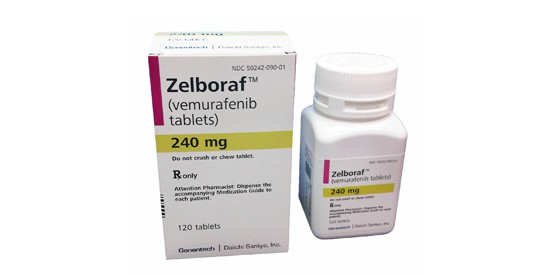
Roche has filed for approval in the US for cobimetinib, an add-on to its already-marketed melanoma therapy Zelboraf.
Cobimetinib is a MEK inhibitor that Roche is developing in collaboration with Exelixis. It is designed to work in tandem with Zelboraf (vemurafenib) in the treatment of melanoma patients whose tumours express the V600 mutation in the BRAF gene.
The drug was submitted for approval in Europe earlier this year and has been awarded fast-track status by the US FDA, raising the possibility of approval in the first half of next year.
Roche’s Genentech unit presented positive phase III results from the coBRIM trial of the combination therapy in first-line BRAF mutant-positive melanoma at this year’s European Society of Medical Oncology (ESMO) conference.
The results revealed that the combination therapy increased progression-free survival (PFS) by 9.9 months, compared to just over six months with Zelboraf alone.
Zelboraf was developed by Roche in collaboration with Plexxikon, a company that was acquired by Daiichi Sankyo in 2011.
The drug has been growing nicely for Roche since its debut in 2011, rapidly becoming the standard of care for melanoma, but has started to slip back in the face of competition from Bristol-Myers Squibb’s (BMS) Yervoy (ipilimumab) and GlaxoSmithKline’s combination of MEK inhibitor Mekinist (trametinib) and BRAF inhibitor Tafinlar (dabrafenib) which was approved in the US in September.
For now, Zelboraf is primarily facing competition from GSK’s combination in the US, as the latter withdrew its marketing application for Tafinlar in Europe earlier this year after the EMA asked for more clinical data to support its efficacy. Zelboraf’s third-quarter sales slipped 8% to $230m in the first nine months of the year.
Meanwhile, all the drugs in the melanoma category are expected to be impacted by the PD-1 inhibitor class, notably Merck & Co’s Keytruda (pembrolizumab), which was approved as a second-line therapy for advanced melanoma in September, and Bristol-Myers Squibb’s Opdivo (nivolumab) which is so far only available in Japan.
Approval of cobimetinib will allow Roche to compete head-to-head with GSK’s combination, which recorded combined nine-month sales of £86m ($134m).
Roche and Exelixis are now planning a phase I trial of the triple combination of vemurafenib, cobimetinib and HSP90 inhibitor XL888 in patients with metastatic melanoma.




